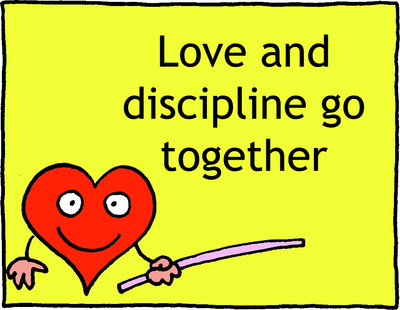Guide
and Discipline
The topic
of how we discipline children is one that is very near to my heart and
something that I wanted to touch on. It is no secret that when parents can get
very frustrated with their children at times, there comes a point where unjust discipline
comes into play. What I mean by unjust discipline is that some parents will
resort to hitting their children to send a message or will verbally abuse them
by calling them names or belittling them. Some parents are under the impression
that it is okay to hit a child, in the way of a spank, to send a message and
others feel that it is completely inappropriate to hit a child in any circumstance.
I am going to be sharing my thoughts on this today and hopefully you will feel
a better sense of why I am against hitting the child or talking down to them to
make a point.
One
of my favorite stories from this semester in school talked of a mother that
wanted to discipline her four or five-year-old son for doing something
particularly bad. She didn’t believe in spanking or hitting children for that
matter, but what her son did finally upset her enough to push her over the
edge. The mom asked her son to get something similar to that of a switch for her
to hit him with to teach him a lesson. When the boy came back, he instead came
back with a stone because he could not find what she had asked. With tears in
his eyes he expressed that he could not find a switch and handed her the rock
to hit him with instead. This broke the mother’s heart. She realized that her
son knew she was going to hurt him regardless, so the reading stated the child’s
point of view, “if my mother wants to hurt me, then it makes no difference what
she does it with; she might as well do it with a stone.” The mother could see
the fear in her son’s eyes and remembered that fear and physical violence
should never be the answer to teaching a child a lesson.
Have
you ever taught your child a lesson by spanking them? I know that I have. I’ll tell
you what I gained from it. My children thought that if they saw one of their
siblings doing something wrong that it was okay to hit them, because they had
known me to do the same. Even though my spanks were not in any way violent, my
children didn’t view it that way. When they went to teach their siblings a
lesson, they did not hold back like I did. Instead they got aggressive towards one
another. In Psychology Today, Denise Cummins Ph.D. explained, “When a parent
tries to get children to behave better by hitting them, that parent is telling
them that hitting people who are smaller and weaker than you is an acceptable
way of getting what you want from them.” I have seen this truth firsthand, and
when I asked my child why they did it, it was because they said that I have
done it.
I
love the scripture in Doctrine and Covenants 121:41-46. It really helps us to understand
how we should be disciplining our children with love instead. Sometimes we have
to be stern with our children, which is completely fine. But the scriptures
teach us in Doctrine and Covenants 121:43 that we should be, “Reproving betimes
with sharpness, when moved upon by the Holy Ghost, and then showing forth afterwards
an increase of love toward him who thou hast reproved, let he esteem thee to be
his enemy.” This powerful scripture teaches us that when we correct our
children, especially in a stern way, we should always show them an excess
amount of love so that they know we are coming from a good place. The
consequence of not showing forth an excess of love is that the child could view
you as an enemy or not feel safe around you. Fear can motivate someone to act,
but it will never be a way to earn their respect or trust in you. Children need
to be nourished in a warm and loving environment in order to reach their full
potential and know right from wrong. Remember when you are disciplining your
child and guiding them, especially in their early years to do it with love and respect.
This is where your lessons will take the most effect on the child in a positive
and meaningful way.
Lisbet Nilson. "Pippi Power: An Interview with
Astrid Lingren." Parenting. October 1992. p. 132.
“This Is What Happens When
You Hit Your Kids.” Psychology Today, Sussex Publishers, 19 Sept. 2014, www.psychologytoday.com/us/blog/good-thinking/201409/is-what-happens-when-you-hit-your-kids.
“Doctrine and Covenants
121.” The Church of Jesus Christ of Latter-Day Saints,
www.churchofjesuschrist.org/study/scriptures/dc-testament/dc/121.41-46?lang=eng.



